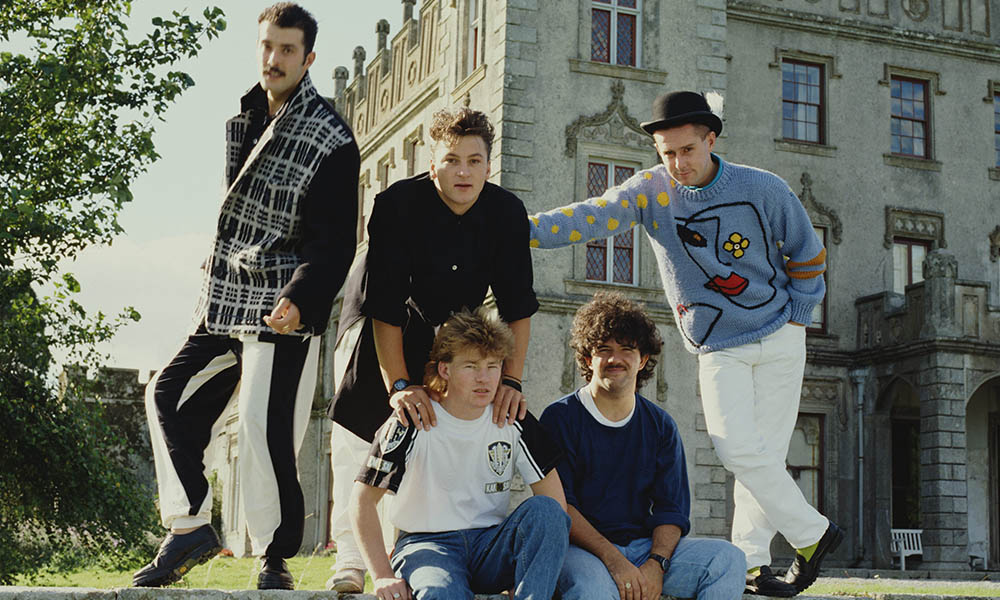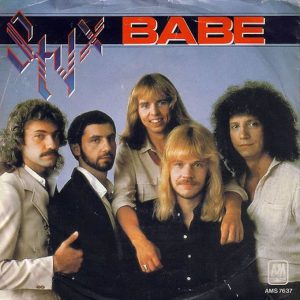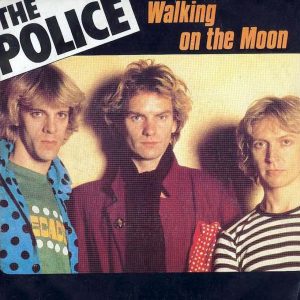From the moment their first single “Relax” was banned by the BBC for its explicit sexual content, Frankie Goes To Hollywood became the biggest music stars in Britain. And while the group’s fame proved to be fleeting, they left behind a run of groundbreaking songs that are among the most creative, provocative, and successful of the 1980s.
Taking their name from a poster about Frank Sinatra’s film career, the Liverpudlian band looked and sounded like nobody else. For starters, their singers Holly Johnson and Paul Rutherford were two outwardly gay men at a time when it was the norm in pop circles to remain in the closest. This was contrasted by the band members behind them, a gang of tough-looking musicians comprised of Peter Gill, Mark O’Toole, and Brian Nash, known affectionately as “The Lads.”
Listen to the best Frankie Goes To Hollywood songs on Apple Music and Spotify.
What made Frankie Goes To Hollywood such a successful group was a brilliant combination of attitude, aggressive, in-your-face marketing (including a series of “Frankie Says” T-shirts that were everywhere), and, most significantly, highly original music under the expert direction of record producer Trevor Horn.
FGTH became the first signings to Horn and his wife Jill Sinclair’s new label ZTT Records, and Horn set about creating a product that sounded like KISS meets Donna Summer. Horn – who was then fast gaining a formidable reputation thanks to his work with ABC, Malcolm McLaren, and others – was looking to literally produce the future sound of music. Utilizing what at the time was the only computer sampler in existence, he made a series of bombastic, but lavish-sounding recordings that made up their 1984 debut album Welcome To The Pleasuredome. With Horn’s deliberately overblown production, the double album shipped 1 million copies pre-release in the UK, while the group’s first three singles all went to No. 1.
But like the Sex Pistols nearly a decade before, it was all over almost as soon as it had begun. The year after the release of their second album Liverpool, the group imploded, leaving behind some of the most era-defining music of the 80s.
The Hits
(Relax, Two Tribes, The Power Of Love, Welcome To The Pleasuredome, Rage Hard)
Frankie Goes To Hollywood’s pounding, hi-energy debut single “Relax” garnered little attention following its release in the fall of 1983. However, by January the next year it had climbed into the UK Top 10 and been performed on Top Of The Pops. It was at that point that Frankie were gifted the most unexpected boost of their fledgling careers. One morning the breakfast show host of the BBC’s flagship national pop station Radio 1 announced live on air his disgust about the single’s sexually-charged lyrics and artwork. As a consequence, “Relax” was banned by the BBC, instantly giving it new-found notoriety and priceless promotion. The song swiftly climbed to No. 1 where it stayed for five weeks and sold 1.8 million copies, making it one of the UK’s 10 biggest-selling singles of all time. It also became the group’s first Top 10 hit in the United States.
FGTH’s second single “Two Tribes” was just as controversial and almost as successful. Released at a time when nuclear holocaust remained a real and ever-present threat, the song juxtaposed its dark theme of the Cold War with joyful lyrics about impending conflict. This was all underpinned by a dramatic, menacing Trevor Horn production and a music video in which US President Ronald Reagan was depicted wrestling the Soviet Union’s General Secretary Konstantin Chernenko. The single not only debuted at No. 1 in the UK and sold more than 1.5 million copies, but its nine weeks at the top was the longest of the decade. Its endurance was in part down to ZTT drip-feeding the market with new 12” remixes.
The follow-up, “The Power Of Love,” was a musical about-turn for the group, a string-laden ballad with a music video featuring the Nativity that was timed for its pre-Christmas release. When it went to No. 1, it made FGTH only the second act in history to score three chart-toppers on the UK singles chart from their first three releases. However, this run ended when the hedonistic fourth single “Welcome To The Pleasuredome” peaked at No. 2.
FGTH visited the UK Top Five one last time with “Rage Hard,” the first single from their 1986 album Liverpool, which introduced a more rock-oriented sound.
The Covers
(Ferry ‘Cross The Mersey, War, Born To Run, San Jose (The Way))
In parallel with their highly-original songs, a recurring theme throughout Frankie Goes To Hollywood’s brief recording career was their interpretations of old classics. These covered the gamut of popular music from Merseybeat and easy listening to Motown and blue-collar American rock.
Two decades after Gerry & The Pacemakers’ “Ferry ‘Cross The Mersey” became a love letter to the Merseybeat group’s home city of Liverpool, fellow Liverpudlians FGTH’s haunting and melancholic take on the song appeared on the 12” version of their single “Relax.” In a neat coincidence, The Pacemakers were the first group before Frankie to place their first three singles at No. 1 in the UK.
For one of the B-sides of “Two Tribes,” Frankie then revisited Edwin Starr’s Vietnam-era protest hit “War,” with their aggressive, punchy version brought bang up to date with the presence of British actor and comedian Chris Barrie impersonating Ronald Reagan.
Even less expected was the group’s cover of Bruce Springsteen’s “Born To Run,” which opens sounding like the Sex Pistols doing “God Save The Queen,” but then turns into a fairly faithful, if somewhat camped-up version of The Boss’s anthem.
They were equally respectful to “Do You Know The Way To San Jose” with their breezy version of the Bacharach & David classic – renamed “San Jose (The Way)” – sequenced next to their Springsteen cover on the group’s debut album.
The Remixes
(Two Tribes (Annihilation), Relax (Sex Mix))
An integral part of the DNA and success of Frankie Goes To Hollywood was a succession of remixes that not only extended the appeal of some of their biggest hits but sometimes turned them into virtually brand new tracks.
A case in point is “Two Tribes” which, alongside its original single edit, was issued in a phased release campaign in six additional 12-inch mixes. The first of these titled “Annihilation” stretched over nine minutes, opened with the sound of an air-raid siren and extensively featured Chris Barrie impersonating Reagan. Over a rapid, hi-energy dance beat, the remix is also punctuated by an ominous narrative from actor Patrick Allen reprising lines of dialogue he had previously recorded for a British Government public information film about how to survive a nuclear war. It is not until five and a half minutes in that Holly Johnson’s lead vocal finally kicks in.
“Relax” was also subject to multiple mixes at the time of its release, including the 16-minute-long “Sex Mix,” which is such a deviation from the original hit version that it contains none of Johnson’s lyrics. It now feels like a 1980s period piece, perfectly capturing Horn’s unique everything-and-the-kitchen-sink production style.
Frankie Goes To Hollywood’s Rock Songs
(Black Night White Light, Warriors Of The Wasteland, For Heaven’s Sake, Watching The Wildlife)
Although on the face of it, Frankie Goes To Hollywood were a regular band comprising a guitarist, bass player, drummer, and two vocalists, their credentials as a rock outfit were only hinted at on their first album. This included the cut “Black Night White Light,” which against type featured a guitar solo and stood out as a highlight alongside the set’s four big hits.
It wasn’t until the release of their second and ultimately final album Liverpool that they displayed more of their rock credentials, a musical transition largely enabled by the arrival of Stephen Lipson as producer. Lipson, who the year before had worked on fellow ZTT act Propaganda’s album A Secret Wish, encouraged the band to play their own instruments. This was in sharp contrast to Welcome To The Pleasuredome, which was dominated by session musicians. The result was more of a heavier rock sound, including “Warriors Of The Wasteland” which, from its quiet, atmospheric opening, suddenly bursts into life, and FGTH rock out in a way that they never did on their first album.
From the same album, “For Heaven’s Sake” takes sharp aim at British Prime Minister Margaret Thatcher at a time of deep economic recession for the UK with Holly Johnson cheekily observing, ”She should buy us all a drink.” “Watching The Wildlife” turned out to be the band’s last single before they split. Although it was largely overlooked at the time, it is a joyous song with uplifting pop hooks and deserves renewed assessment. While Frankie Goes To Hollywood’s reign was brief, in little more than two years they hit pop perfection with some of the decade’s greatest and most enduring songs.
Think we’ve missed one of the best Frankie Goes To Hollywood songs? Let us know in the comments section below.




